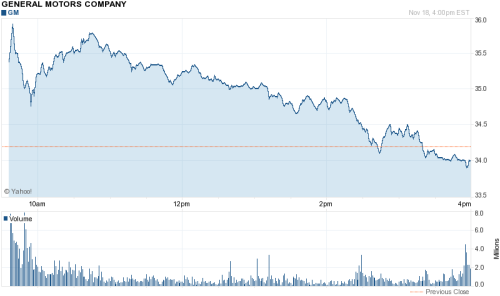8 Good Reasons NOT to Call General Motor’s IPO a Success
November 19, 2010 by Stephen VanNuys

ATLANTA— The General Motors initial public offering was completed yesterday to much fanfare, with GM raising $15.8 billion, the second highest IPO in history (second only to VISA in 2008). Barack Obama called the IPO part of GM’s success story and declared: “we are finally beginning to see some of these tough decisions that we made in the midst of the crisis pay off.” The U.S. Treasury sold 358 million shares as part of the IPO, raising $11.8 billion. Democrats have been quick to call it a success, and progressives have been eager to declare Barack Obama pulled Michigan up off the mat with his bold actions. …but is this really a success?
All the articles being written at present seem to be showing the good side of this IPO. You have to dig a little deeper to find the true, glaring warning signs at General Motors:
1.General Motors still owes the U.S. government approximately $30 billion, with the government still owning around 30 percent of the Company. If the government were to sell its remaining holdings in General Motors at the IPO offering price, they would lose billions.
2.General Motors’ financing arm still owes the U.S. government an additional $15 billion.
3.Because the government owns such a substantial portion of General Motors, the Company’s business decisions will continue to be clouded by political considerations. For instance, the Company is contractually obligated to maintain government-approved production levels through at least 2014.
4.The U.S. government executed the bailout of General Motors by unilaterally breaking private contracts with individual bondholders, setting an ominous precedent in the market-place.
5.General Motors is investing heavily in ideologically driven products like the Volt, which are destined to be money losers.
6.General Motors’ sales of late have been buoyed by the precipitous drop in sales of Toyota products in the U.S. market, which have been driven lower because of fallout from the product recalls earlier in the year (which themselves may have been blown out of proportion by the Obama Administration via the Transportation Department). This trend may not hold over the long-term.
7.General Motors’ internal controls over financial reporting are a mess, which it has repeatedly disclosed in its public filings. In short, you shouldn’t trust the financial data it produces for the foreseeable future.
8.The United Auto Workers are still heavily invested in the company (around 20%) and have been pushing back against wage control efforts by the company. The wage control efforts are intended to make GM more competitive by bringing wages into line with those at non-unionized Honda and Toyota in the South.
I expect this IPO to be sort of a flop over the short-to-medium term and I fully expect that the government will be invested in General Motors for years to come.










No comments:
Post a Comment